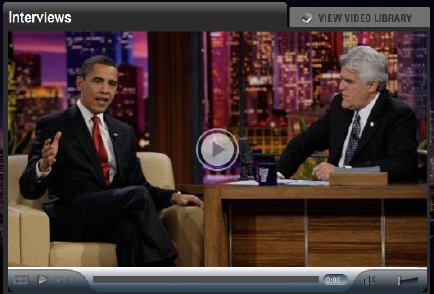-
NBC.com is Missing At Least 75% of Potential Ad Revenue in Obama-Leno Video
Watching President Obama's appearance on "The Tonight Show with Jay Leno" on NBC.com over the weekend was a classic reminder of how so many sites miss out on so much of their total broadband video advertising opportunity.
The interview, which lasts over 24 minutes, carried just one 15 second pre-roll ad, (for Subway, when I watched it) along with a companion banner. Twice during the interview, Leno interrupted the President to pause for a TV commercial break, but when he did so, there was no mid-roll ad inserted by NBC.com. There was also no post-roll ad appended, just a promo graphic for the show itself.
If you figure there were at least 4 potential 15 second avails (1 pre-roll, 1 post-roll and 2 mid-rolls), but only the pre-roll was filled, it means that NBC.com missed out on 75% of the potential ad revenue that each full stream viewer would have generated. In reality the percentage is probably even higher because the mid-rolls could likely be 30 seconds or more.
That degree of under-monetization is pretty disappointing. Don't get me wrong, I'm not advocating that broadband video streams become overwhelmed with ads, which would surely cause a consumer backlash. But I do believe that providers of premium content like NBC.com (and there are few videos more premium than the first time ever a U.S. President has appeared on the "Tonight Show") must recognize and monetize their opportunities effectively. There are at least three reasons why:
First, and most obviously, broadcast networks' poor recent financial performance demands that they seize every available money-making opportunity. Not doing so is just bad business. How many businesses succeed long-term when they don't execute on all chances to generate revenue?
Second, NBC.com and other premium video providers are setting a bad precedent for consumers' expectations. If I can watch 24 minutes of Leno with just one 15 second ad, then if and when NBC.com tries to increase the ad load, I'm inevitably going to be displeased. In short, NBC is devaluing its own content by not serving notice to broadband viewers NOW, that a "price" - in the form of watching ads - must be paid for access.
Third, and tying together the first two reasons, is that it is urgent that networks learn how to achieve economic parity between programs viewed via broadband delivery vs. on-air delivery.
That's because the era of broadband-connected TVs has already begun, and is poised to gain further steam as new devices and connected TVs proliferate.
As this happens, online viewing will no longer be merely supplemental for many viewers to on-air, as it often (thought not exclusively) is today. Rather it will be substitutive. That means viewers will watch Leno via broadband on their TVs, instead of via cable/satellite/telco or over-the-air delivery. Just as "Tonight" would never go 24 minutes on-air without an ad pod (which consists of more than one just 15 second ad btw); NBC.com should never let this happen online. Doing so will cause major damage to its future P&L.
In his Media Summit interview last week, NBCU's Jeff Zucker said the company has already evolved from "digital pennies" to "digital dimes." Yet Hulu's recent stiff-arming of Boxee underscores the reality that networks are nowhere close to economic parity between online and on-air delivery of their programs today. Neither consumers nor technology are standing still waiting for them to catch up. Behaviors, expectations and future economics are being formed right now.
NBC.com - and others - need to be mindful of this and ensure that when they put their premium video online they're fully capitalizing on their ad opportunities. If they don't, then 5 years from now Mr. Zucker will wind up like so many of today's newspaper CEOs - lamenting, not praising, his company's "digital dimes," long after his "analog dollars" have evaporated.
What do you think? Post a comment now.
Categories: Advertising, Broadcasters


